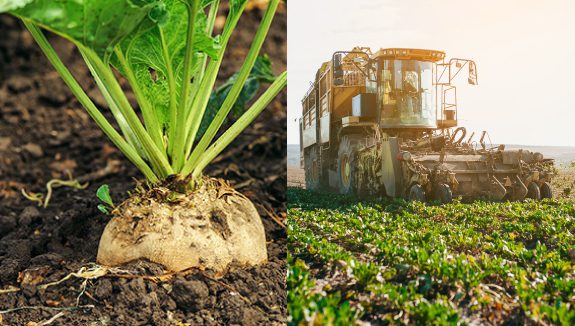The Great Argument: Sugar Beet Vs Sugar Cane - Which Is the Superior Choice for Sweeteners?
The argument over sugar beet versus sugar cane as the favored sweetener involves a number of essential variables. Each offers distinctive advantages and challenges concerning manufacturing, taste, and health and wellness effects. While sugar beet may appeal to those prioritizing sustainability, sugar cane has its very own cultural and cooking value. As consumers end up being extra conscious of their selections, the inquiry continues to be: which sweetener really sticks out in today's market?
The Origins of Sugar Beet and Sugar Cane
Sugar cane has been cultivated for thousands of years, mainly in tropical areas, sugar beet arised as a considerable alternative in cooler climates throughout the 18th century. Sugar cane, indigenous to Southeast Asia, was first trained around 8000 BCE and spread globally via trade and expedition. Its high sucrose material made it a useful plant, resulting in comprehensive haciendas in regions like the Caribbean and Brazil.
On the other hand, sugar beet was initial cultivated in the Mediterranean around the 18th century, particularly getting grip in Europe as a reaction to sugar cane scarcities. The plant grows in pleasant environments, making it appropriate for regions with chillier weather. The discovery that sugar can be drawn out from beet roots changed sugar production, specifically throughout the Napoleonic Battles when profession restrictions minimal cane sugar accessibility. The rise of sugar beet farming noted a turning point in the history of sweeteners, offering a neighborhood resource for many nations.
Manufacturing Procedures: From Field to Sugar
The production procedures of sugar beet and sugar cane disclose significant differences in growing methods, collecting methods, and improvement phases. Recognizing these nuances is necessary for appreciating exactly how each crop adds to the overall sugar market. This comparison highlights the unique qualities and difficulties connected with both sources of sweetness.

Cultivation Strategies Comparison
Farming strategies for sugar beet and sugar cane expose distinct techniques that affect their manufacturing procedures, from field prep work to last sweetener removal. Sugar beet farming typically includes raking and harrowing to create a great seedbed, complied with by seeding in rows to help with development. This crop gain from cooler climates and is often grown in spring. In comparison, sugar cane is generally planted in furrows with pre-sprouted cane items, calling for a warm, exotic climate for optimal development. Cane areas are usually laid out to manage water effectively, offered its need for considerable irrigation. Both plants are handled with details fertilization and parasite control methods customized to their development settings, influencing return quality and performance in sweetener removal.

Harvesting Techniques Explained
Reliable harvesting approaches for sugar beet and sugar cane play a crucial role in guaranteeing maximum return and quality of the end product. Sugar beet collecting generally uses mechanical root harvesters, which efficiently root out the beetroots from the soil and different them from the foliage. This technique reduces damage to the beetroots and lowers labor expenses. On the other hand, sugar cane harvesting may utilize either hands-on labor or equipment, depending on the area and scale of production. Mechanical farmers reduced the cane at the base and commonly strip away the leaves, enhancing the process for bigger fields. Both methods require cautious timing to assure the crops are gathered at peak sweetness, affecting the top quality of the last sweetener product.
Improvement Process Differences
While both sugar beet and sugar cane undertake extensive improvement processes to change their raw types into functional sugar, the techniques used differ significantly. Sugar beet refinement starts with washing and cutting the beets into slim cossettes, adhered to by diffusion, where warm water essences sucrose. The resulting juice is after that purified, focused, and taken shape. In contrast, sugar cane processing entails crushing the stalks to draw out juice, which is then cleared up using lime and warmth to get rid of impurities. The cane juice is vaporized to create syrup before formation. Ultimately, while both procedures aim to produce white sugar, the distinct strategies highlight the unique features of each resource and their implications for flavor and pureness in the end product.
Nutritional Profiles: What's in Your Sweetener?
The dietary profiles of sugar beet and sugar cane present unique differences worth checking out. This comparison consists of facets such as calorie web content, mineral and vitamin visibility, and variations in glycemic index. Recognizing these variables can provide understandings right into just how each sugar may affect general wellness.
Caloric Web Content Comparison
Understanding the caloric material of sugar beet and sugar cane is important for those conscious of their nutritional options. Both sweeteners mainly are composed of sucrose, adding a similar caloric value. Generally, sugar beet consists of approximately 387 calories per 100 grams, while sugar cane has regarding 390 calories per the very same quantity. The slight difference in caloric material might not considerably impact most diets; nevertheless, it is impressive for those carefully monitoring their calorie consumption. Additionally, both sugar sources offer energy yet do not have essential nutrients, making them mostly resources of vacant calories. Individuals seeking much healthier choices might desire to take right into account these aspects when selecting between sugar beet and sugar cane as their liked sugar.
Mineral and Vitamin Content
Calorie web content provides just a component of the image when examining sugar beet and sugar cane. Both sources of sugar differ substantially in their mineral and vitamin accounts. Sugar beets are remarkably abundant in crucial nutrients, consisting of potassium, magnesium, and iron. They likewise contain percentages of vitamins such as B6 and folate, adding to their nutritional worth. On the other hand, sugar cane uses a different collection of benefits, having calcium, phosphorus, and traces of B vitamins. While neither choice is a substantial source of nutrients contrasted to entire foods, sugar beets may have a mild edge because of their greater mineral content. Inevitably, customers seeking nutritional advantages from sweeteners should think about these distinctions in profiles.
Glycemic Index Differences
Glycemic index plays a necessary role in examining how various sugar influence blood sugar level levels. Sugar beet and sugar cane show significant distinctions in their glycemic responses. Usually, sugar beet has a lower glycemic index contrasted to sugar cane, causing a slower and steadier rise in blood sugar degrees after intake. This feature may make sugar beet a better option for people handling diabetes or those looking for to maintain stable energy degrees. On the other hand, sugar cane tends to cause a more rapid spike in blood sugar level, which can bring about quicker energy crashes. Comprehending these differences is significant for customers aiming to make enlightened dietary options regarding sugar and their effect on overall health.
Ecological Influence: Sustainability Factors To Consider
While both sugar beet and sugar cane are important sources of sugar, their environmental influences and sustainability factors to consider differ substantially. Sugar beets, largely expanded in warm regions, normally require much less water and can be grown in diverse climates. They also benefit from crop rotation techniques, which enhance soil health and reduce the demand for artificial plant foods. Nonetheless, intensive farming of sugar beets can lead to soil deficiency and chemical use.
On the other hand, sugar cane grows in exotic climates and frequently necessitates significant water resources for watering (Sugar beet vs sugar cane). The monoculture nature of sugar cane farming can intensify dirt erosion and biodiversity loss. Furthermore, the burning of cane fields prior to harvest launches carbon emissions and adds to air pollution. Both crops deal with difficulties pertaining to environment change, yet their differing cultivation techniques greatly affect their general sustainability accounts. The option in between sugar beet and sugar cane includes weighing these ecological influences carefully.
Taste and Culinary Uses: Which Sugar Reigns Supreme?
The selection between sugar beet and sugar cane extends beyond ecological factors to consider to encompass preference and culinary applications. Sugar beet, frequently viewed as having a somewhat different flavor profile, tends to be less sweet than sugar cane. This refined difference can influence its usage in recipes, particularly in baked goods where a neutral sweetness is wanted.
Conversely, sugar cane is celebrated for its distinctive, rich, and much more complex flavor, making it a preferred selection for beverages and treats - Sugar beet vs sugar cane. Its all-natural molasses content can enhance the deepness of tastes in blog various recipes
In food preparation, sugar cane's adaptability radiates through in sauces, lusters, and confections, while sugar beet is generally found in refined foods and sugar like granulated sugar. Eventually, the decision between both sugar frequently pivots on private preference preferences and certain culinary applications, with each offering special advantages in the cooking area.
Wellness Effects: Sugar Beet Vs Sugar Cane
Both sugar beet and sugar cane have distinctive health and wellness implications that can influence consumer selections. Sugar beet vs sugar cane. Sugar beet is commonly regarded for its greater fiber web content, which can assist digestion wellness. Furthermore, it has certain antioxidants that might add to general health. On the other hand, sugar cane is abundant in nutrients such as calcium, potassium, and magnesium, using some mineral benefits
However, both resources mostly contain sucrose, which can cause similar health worries when consumed excessively, such as weight problems, diabetic issues, and heart condition. The processing methods also vary; sugar beet is normally refined much more intensively, possibly leading to a loss of certain nutrients. Consumers worried regarding additives might prefer sugar cane, as it commonly goes through much less handling. Eventually, understanding these health and wellness effects can lead people towards making notified choices regarding their sweetener choices.
Consumer Preferences: Patterns and Insights
Customer choices for sweeteners have actually advanced considerably recently, YOURURL.com influenced by wellness trends, environmental worries, and nutritional choices. Increased recognition of the unfavorable health and wellness impacts connected with excessive sugar consumption has actually led lots of consumers to look for alternatives. This shift has motivated an expanding rate of interest in all-natural sweeteners, with sugar beet and sugar cane going to the center of conversations.
Research suggests that consumers are significantly favoring sugar beet due to its viewed ecological advantages, as it is usually grown closer to refining plants, minimizing transport discharges. Conversely, sugar cane is typically related to exotic areas and may lug perceptions of sustainability obstacles.

Often Asked Inquiries
Exactly How Do Sugar Beet and Sugar Cane Affect Blood Sugar Levels?
Sugar beet and sugar cane both contain sucrose, which can boost blood sugar levels. The influence mainly depends upon individual metabolism and usage quantities, yet both sources contribute similarly to blood sugar actions most of the times.
Which Sugar Is Better for Cooking and Food preparation?
When reviewing sweeteners for baking and food preparation, one need to think about structure, flavor, and wetness retention. Sugar beet and sugar cane both provide special high qualities, with sugar cane frequently preferred for its richer taste profile in cooking applications.
Can Sugar Beet or Cane Be Made Use Of in Vegan Diets?
Both sugar beet and sugar cane can be used in vegan diets. They are plant-derived sugar, making them suitable for people looking for vegan-friendly alternatives without pet items, guaranteeing ethical choices in their cooking techniques.
What Are the Historical Uses Sugar Beet and Cane?
Historically, sugar beet and cane worked as necessary sources of sweetness, with cane grown in exotic areas and beet in warm areas. Both have great post to read actually been important to numerous societies, economies, and cooking traditions throughout history.
Exist Any Alternatives to Sugar Beet and Cane?
Alternatives to sugar beet and cane consist of agave nectar, honey, maple syrup, and synthetic sugar like aspartame and sucralose. These replacements use varying tastes and health and wellness advantages, appealing to diverse nutritional preferences and limitations.